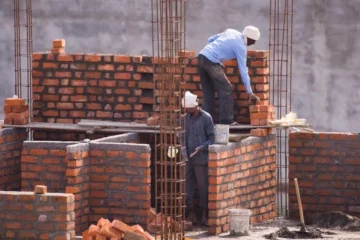
If the stay on construction activities imposed by the Supreme Court in certain states gets extended, it could lead to real estate project delays and litigations, say realty experts.
The SC imposed a stay on construction in Maharashtra, Madhya Pradesh, Uttarakhand, and Chandigarh for not framing any policy on solid waste management.
According to CARE Ratings, the real estate sector could be hurt due to delay in project deliveries and related RERA implications in the form of penalties.
Cascading impact in terms of additional non-performing assets (NPAs) due to disruption in operations cannot be ruled out. Disruption in construction activity could impact demand for steel and cement and therefore, on the overall growth of core sectors till further orders of the apex court, it said.
According to the research firm, Citi, the blanket ban on construction could impact projects, and if imposed for long, can severely delay the projects.
Real estate shares Monday traded lower by 2-3 percent after the SC banned further construction.
“Solid waste management is not limited to the construction sector. Vegetable waste in subzi mandis, uncovered drains, unmanaged garbage – what about those? As many as 5 crore people are employed by the sector. Daily wagers will be impacted the most. This order is also expected to have a multiplier effect – work may stop for as many as three months leading to delays. Litigations may also kick in,” said Getamber Anand, Chairman Credai.
The SC’s intention is good from a longterm perspective but a blanket ban stopping all construction will have a negative impact on housing. It will choke supply, and impact home seekers. Effectively, home buyers will suffer just because some state governments have not formally notified the policy. Perhaps, it would have been better if the Hon’ble Court would have penalised the state administration and barred new construction while allowing on-going projects to be completed, said Niranjan Hiranandani, President (National), NAREDCO.
Last week, a bench of Justices Madan B Lokur and S Abdul Nazeer said “if they want the people to live in dirt, filth, and garbage, what can be done then” and slapped varied fines on some state governments and union territory (UT) administrations.
The court said it was “unfortunate” that states and UTs had not yet framed any policy under the 2016 Solid Waste Management Rules, even after the passage of two years.
“In case the states have the interest of the people in mind and cleanliness and sanitation, they should frame a policy in terms of the Solid Waste Management Rules so that the states remain clean,” the bench said.
“The attitude of the states/union territories in not yet framing a policy even after two years is pathetic, to say the least. Further constructions in the states/union territories are stayed until the policy is framed,” it said.
The issue of waste management cropped up while the court was dealing with an incident that took place in 2015 in which a seven-year-old boy had died due to dengue in Delhi.
At Friday’s hearing, the court imposed a cost of Rs five lakh on Andhra Pradesh for not filing an affidavit as per the court’s direction on July 10 and observed that even the Centre was not aware whether the state had framed the policy.
The bench also slapped a cost of Rs three lakh each on Madhya Pradesh, Maharashtra, Uttarakhand, and Chandigarh. The court said the costs imposed on these states and union territory should be deposited with the Supreme Court Legal Services Committee in two weeks for its utilisation for juvenile justice issues.
It also noted that states including Bihar, Tamil Nadu, and Arunachal Pradesh have deposited the costs imposed on them by the court on July 10.
The apex court had earlier taken strong note of non-implementation of solid waste management rules in the country and observed that “India will one day go down under the garbage”.
The matter is listed for further hearing on October 9.
[“Source-moneycontrol”]



